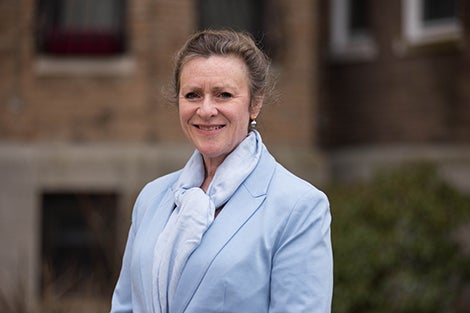May 4, 2015 — Dervilla McCann’s face lights up as she recalls the day in 2012 when she learned that the Supreme Court had upheld the Affordable Care Act. A cardiologist with more than 25 years of experience in clinical practice and hospital administration, McCann knew she couldn’t pass up the opportunity to be part of the wave of changes to the health care system brought about by the new law. To get the tools she’d need, she decided to enroll last year as an MPH student at Harvard T.H. Chan School of Public Health.
After graduating in May, McCann will return to Central Maine Medical Center in Lewiston, ME, a hospital where she previously worked as a clinician. She’ll serve as an executive in its Accountable Care Organization (ACO), working to help doctors and other health care providers affiliated with the hospital provide coordinated care to their Medicare patients.
“The old model of health care was that you got hospitalized, you went home, you were done,” McCann said. But ACOs manage a spectrum of care over a long period of time. “The focus is not on health care, but on being healthy. It’s right up my alley and it’s going to be a lot of fun.”
McCann enjoys a challenge, and the opportunity to bring people together to work toward a common goal. She served in the Navy early in her medical career, and became director of the cardiac intensive care unit at the National Navy Medical Center in 1994. She later went into private practice before taking a position as division head of the Department of Cardiology at St. Mary’s Regional Medical Center, also in Lewiston.
As a cardiologist, she was a “jack of all trades,” she said, performing a variety of tasks from implanting pacemakers to counseling patients. She began her career during a time of rapid evolution in cardiology, and loved its spirit of innovation and experimentation. But as the field grew more specialized, her work became more focused on a narrower set of skills.
A taste of public health
To keep challenging herself professionally, McCann took on new projects on top of her work as a clinician and hospital administrator. At St. Mary’s, she developed and directed the hospital’s cardiovascular disease risk assessment program. She went into workplaces around the state and tested teachers, firefighters, and others on measures such as blood pressure and cholesterol levels.
The results, she said, were astonishing. Some 60% of people in the groups she measured had a moderate to high risk of a cardiovascular event in the next 10 years. The firefighters’ numbers were particularly worrisome, so she followed up with an intervention. The approach was simple: Give them information about how to lower their risk, and provide exercise equipment to the firehouse to help them take the first step.
“Six months later, we tested the firefighters again and saw a 75% drop in the highest risk and a 50% drop in the moderate risk,” McCann said. “I was the nudge that got them started, but their culture made a choice to change. It was really powerful.”
Having such direct impact fueled McCann’s growing interest in public health, but when she ultimately arrived at the School she was unsure about which of many possible directions she should choose. So she took courses in consumer behavior and health care marketing, refreshed her knowledge of the basics in epidemiology and statistics, studied “finance, finance, finance,” and learned from the experiences and idealism of her fellow students.
Returning home
By the end of her first semester, she finally achieved some clarity. She realized that the place where she could make the biggest impact after graduating was back at Central Maine Medical Center.
“The next 10 years are going to be a fasten-your-seatbelt period in health care,” McCann said. “I feel that health care providers like me who’ve been in the trenches and understand how health delivery works and understand the role of the physician, the patient, socioeconomic determinants of health, and other intersecting factors, are going to inform the direction.”
For McCann, taking a year off from her career to get her MPH has made all the difference. “This was absolutely one of the smartest moves I ever made, right up there after marrying my husband and going to medical school. And the rewards from this experience will just continue.”
